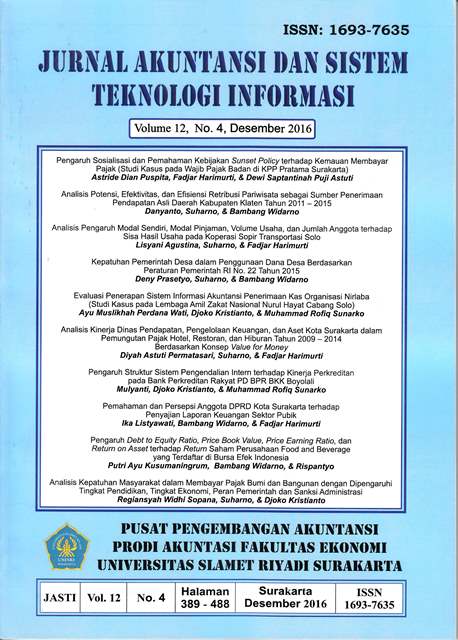ANALISIS PENGARUH MODAL SENDIRI, MODAL PINJAMAN, VOLUME USAHA, DAN JUMLAH ANGGOTA TERHADAP SISA HASIL USAHA PADA KOPERASI SOPIR TRANSPORTASI SOLO
Abstract
The purpose of this study was to determine the significance of the influence of their own capital, loan capital, the business volume and the number of members simultaneously on operating results in the Cooperative Transport driver Solo (Solo Kosti) Year 2005 - 2015. The research method using the case study method, the type of data used quantitative and qualitative data, the data source used secondary data. Data collection methods used documentation. Data analysis techniques used classical assumption test, multiple linear regression analysis, t-test, F and coefficient of determination. In conclusion: 1) There is a positive and significant influence on the rest of the equity in the operating results Transport Cooperative driver Solo (Solo Kosti). 2) There is no significant positive effect of loan capital, business volume, and the number of members to the rest of the results of operations in the Cooperative Transport driver Solo (Solo Kosti). 3) There is significant influence free variables own capital, loan capital, the business volume and the number of members simultaneously on the dependent variable is net income in the Cooperative Transport driver Solo (Solo Kosti).
Keywords: equity, loan capital, business volume, number of members, net income
Downloads
Published
Issue
Section
License
Authors who publish this journal agree to the following terms:
- Authors retain copyright and grant the journal right of first publication with the work simultaneously licensed under a Creative Commons Attribution License that allows others to share the work with an acknowledgement of the work's authorship and initial publication in this journal.
- Authors can separately make additional contractual arrangements for non-exclusive distribution published by the journal (e.g., publish it in a book), with an acknowledgement of its initial publication in this journal.
- Authors are allowed and encouraged to send their work via online (e.g., in the institutional repositories or their website) after published by the journal.










